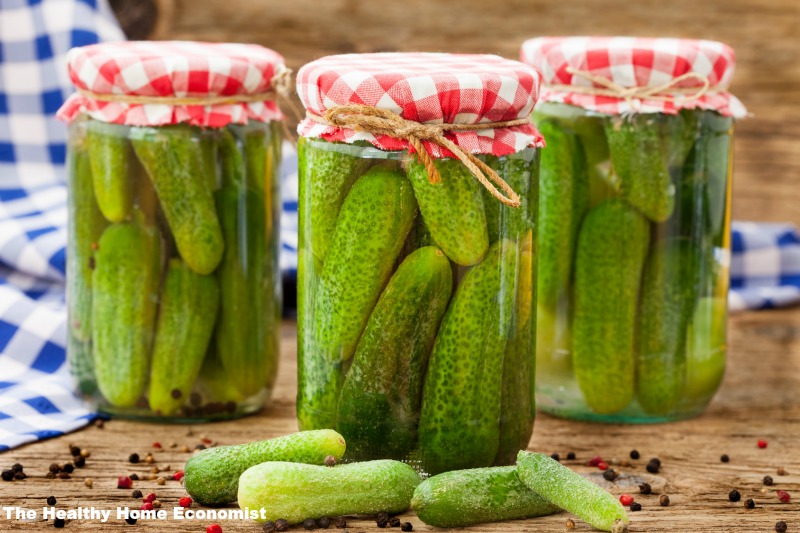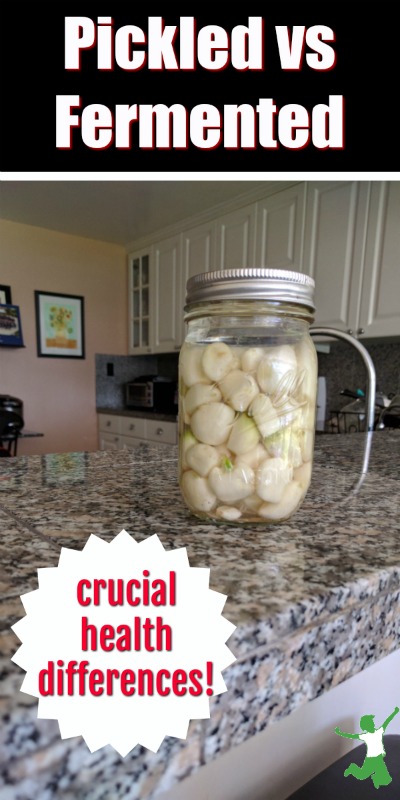The often overlooked differences between pickled and fermented foods. They are not necessarily the same nor do they offer the same benefits to health.
There seems to be a bit of confusion going around about fermented foods and the difference between what you make in your kitchen and the pickled versions that are available on the supermarket shelf. For example, in one of my video lessons, I demonstrate how to make sauerkraut in the traditional manner.
After the shredded cabbage ferments on the kitchen counter for a few days, it is then refrigerated or kept in a cool cellar where the sauerkraut remains naturally preserved for extended periods of time.
How does this homemade pickled cabbage compare to the pickled cabbage in a jar in the supermarket? What about pickled cucumbers or pickled garlic, also popular commercial choices?
Pickled vs Fermented Foods
Alex Lewin, author of Real Food Fermentation explains that the confusion comes from the overlap in definition. In a nutshell, not all fermented foods are pickled and not all pickles are fermented.
In other words, foods that are pickled are those that have been preserved in an acidic medium. In the case of various types of supermarket pickles on the shelf, the pickling comes from vinegar.
These vegetables, however, are not fermented (even though vinegar itself is the product of fermentation) and hence do not offer the probiotic and enzymatic value of homemade fermented vegetables.
Vegetables that you ferment in your kitchen using a starter, salt, and some filtered water create their own self-preserving, acidic liquid that is a by-product of the fermentation process. This lactic acid is incredibly beneficial to digestion when consumed along with the fermented vegetables or even when sipped alone as anyone on the GAPS Intro Diet has discovered (cabbage juice anyone?). In other words, homemade fermented veggies are both fermented and pickled.
Alcoholic Fermentation
What about alcoholic fermentation?
In the case of wine and unpasteurized beers, fermentation occurs as the result of certain yeasts converting sugars into alcohol but there is no pickling that takes place despite the common expression that a person who has had too much to drink is “pickled”.
4 Benefits of Culturing without Heat or Pressure
Home fermentation of vegetables preserves without the use of any pressure or heat unlike supermarket versions of the same foods. It allows the ubiquitous and beneficial lactobacilli present on the surface of all living things – yes, even your own skin – to proliferate creating lactic acid which not only pickles and preserves the vegetables, but also promotes the health of those that consume it in the following ways:
- Enhances the vitamin content of the food.
- Preserves and sometimes enhances the enzyme content of the food.
- Improves nutrient bio-availability in the body.
- Improves the digestibility of the food and even cooked foods that are consumed along with it!
Avoid Shelf Stable Pickled Foods
So don’t be fooled by unhealthy supermarket pickled versions of homemade fermented foods.
These modern foods are the product of high heat and pressure which destroys nutrients and does not in any way enhance health.
The one exception to this rule is the various fermented foods in the refrigerator section of many health food stores. These products are actually fermented and pickled. The only drawback is that these gourmet items are rather expensive compared to the pennies per ounce it costs to make them yourself.
If home fermentation is a kitchen goal that you are ready to tackle, there are plenty of fermented foods recipes on this blog to help get you started on this fun journey! If you prefer trying fermented beverages first, the provided link will take you to over two dozen recipes to consider.









thank you for this !
Thanks for the article! I have been making sauerkraut for about 6 months now and my entire family loves it. The last batch I made I used additional sea salt, per Nourishing Traditions, instead of whey (I had ran out). We definitely like our “whey” sauerkraut better than the last “salt only” batch. Besides the taste (far saltier!) is there a benefit one way or the other to using salt only?
We are now hooked on homemade sauerkraut! I have been making it for the last year and we won’t go back to store bought. It is an easy process, and truly helps in digestion. Thanks for bringing clarity to the difference between real fermented vegetables and the vinegar – store bought variety.
My mom bought me Nourishing Traditions for Christmas because she knew I wanted it for a while now! I’ve already started embarking on my health journey for a while now, but I’m excited to get down and dirty with Enig and Fallon’s recipes. 😀
By the way, I have a new fermentation video coming out soon. I filmed it last week 🙂
Can’t wait to see it. 🙂
Why yes, yes I am!
Hi Sarah.
Our long time kitchen habit is to cook vinegar & muscovado sugar. After cooking it is poured into a glass jar with bitter gourd, carrots, fresh garlic, fresh onions, bell peppers, and other vegetable combinations.
What is this recipe called?
I would like to learn how to modify the recipe above to make it fermented. Is this possible?
Thanks.
Are Bubbie’s pickle or sauerkraut the fermented kind?
Bubbie’s is definitely fermented .. it’s in the refrigerated section and there’s no vinegar in it. A good stand-in until you get your own fermentation machine going at home 🙂
The sauerkraut is fermented but I don’t believe the pickles are. I just bought a couple jars at Whole Foods of the sauerkraut and saw they had bread & butter pickles as well. B&B pickles are my absolute fave, so of course I had to buy a jar. Putting them into the frig at home, I noticed that while the sauerkraut jars said to keep in the refrigerator, the B&B jar said to “refrigerate after opening” which I interpret as meaning the pickles were not fermented.
I know this is an older post, but I just wanted to clarify something on Bubbies. Their regular pickles, relish and tomatoes are all fermented, and sold raw. The Bread and Butter pickles are not fermented, but pickled with the vinegar method (I believe this was so they could fulfill their demand). Their saurkraut is also fermented, and treated with low heat (under 135 degrees) to slow the fermentation, as they otherwise would have trouble with exploding and leaking jars. This means that their saurkraut is not raw, yet it is not pasturized, either, and does still have live cultures (their estimate is about 90%). They explain all this on their website.
They have a dill pickle which is fermented, and a sweet bread and butter pickle which is pickled in vinegar.
A good way to know for sure is to check the label for words like “raw”, “lacto-fermented”, “unpasteurized”, “contains live active cultures/probiotics”, AND if it’s sold in the refrigerated section.
Kimberly Lewis here’s an article about fermentation from the blogger I was telling you about. So glad you all came over. We all really enjoyed the visit. Have a great time with your family and safe travels home!
What about adding vinegar after the fermenting process for a more “pickle flavor”?
That should be ok but don’t use balsamic vinegar from the store as it usually has sugar added.
get the ball jar canning book. it tells you how to do dill pickles in the crock then you have flavor and the pro-biotics. just good old fashion pickling
Thanks. Learning to ferment veggies is one of my goals for the year.